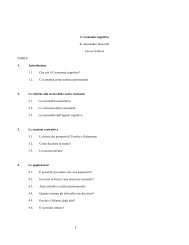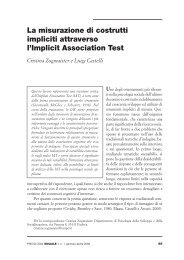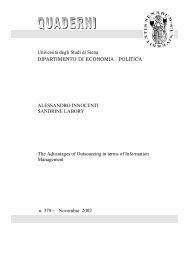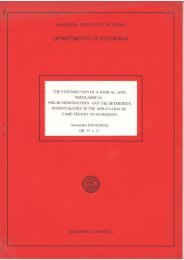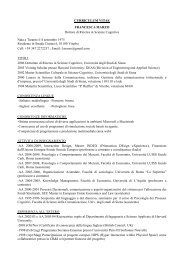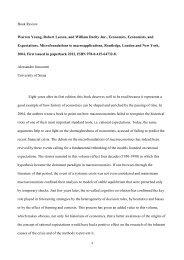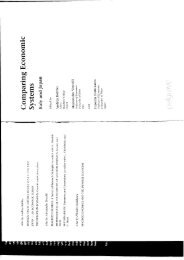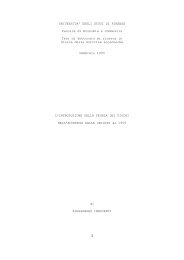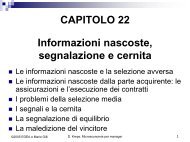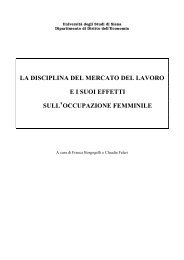Abstracts Book - LabSi
Abstracts Book - LabSi
Abstracts Book - LabSi
You also want an ePaper? Increase the reach of your titles
YUMPU automatically turns print PDFs into web optimized ePapers that Google loves.
Martin Kocher*°, Matthias Sutter**° and Florian Wakolbinger° (**CREED, University of<br />
Amsterdam, **University of Cologne, °University of Innsbruck)<br />
“Naïve advice and observational learning in experimental beauty-contest games”<br />
We examine the effects of naïve advice and observational learning on the quality of decision<br />
making in interactive tasks. Although many everyday decisions are influenced by receiving advice<br />
or by observing others, little is known so far whether these types of information pay off in<br />
interactive situations. We report the results of an experimental beauty-contest game where either<br />
one or all subjects receive advice or observe others. Both triggers faster convergence to the<br />
equilibrium. Yet, advice has a stronger impact because subjects receiving advice systematically<br />
outperform uninformed subjects. Observing others’ past behaviour has only a transitory influence,<br />
though.<br />
Giuseppe Attanasi* and Rosemarie Nagel** (*Bocconi University, **Universitat Pompeu Fabra)<br />
“Actions, Beliefs and Feelings: an experimental study on Psychological Game Theory”<br />
1. An experimental test for Psychological Games<br />
Causal relations among beliefs and actions have been widely studied in economics and psychology.<br />
One regularity emerging from both disciplines involves a positive relationship between individuals<br />
actions and their (first-order) beliefs of others actions in strategic decision environments. Moreover,<br />
even though one traditional assumption in neoclassical economics has been material self-interest, in<br />
the last few decades economists have studied the role played by emotions in generating human<br />
behaviour (i.e. actions), hence suggesting general ways of incorporating emotions and feelings into<br />
the economic models; in particular, it has been widely accepted in the economic theory that feelings<br />
can be expressed in terms of belief-dependent motivations, for example in terms of one’s<br />
expectations about other agents’ actions (first-order beliefs) and in terms of one’s guess about other<br />
agents’ expectations about his own action (second-order beliefs) and so on. The main goal of this<br />
paper is to study in an experimental setting the relations between actions and beliefs, those between<br />
beliefs and feelings and those between actions and feelings, through the application of<br />
psychological game theory. Many experimental economists have studied these relations within oneshot<br />
interactions, allowing for ex-post explanations claiming for belief-dependent motivations for<br />
the “irregularities” in the experimental results. Our experimental study goes two steps beyond the<br />
existing literature:<br />
a. it analyses the relationships between actions, beliefs and feelings in a dynamic setting. We test<br />
players’ behaviour in a infinitely repeated game, in which we elicit beliefs at the beginning of each<br />
stage game; we then analyze the evolution of beliefs, their correlation with the played action profile<br />
and the way through which they incorporate players’ feelings.<br />
b. it allows to test directly games with beliefs-dependent payoffs, i.e. psychological games. We<br />
allow psychological payoffs to depend (only) on the beliefs of others, as Battigalli and Dufwenberg<br />
(2005) suggest. Their approach, crucial for our experimental setting, clearly separates two channels<br />
through which beliefs and information affect behaviour: the direct (psychological) impact of beliefs<br />
on preferences over terminal histories, and the (traditional) impact of updated beliefs about the<br />
opponents on the preferences over own strategies. In other words, our experimental setting is able to<br />
test the casual relations and the potential correlation between actions, beliefs and feelings in a<br />
repeated psychological game, i.e. a game in which players have belief-dependent motivations,<br />
which give rise to psychological payoffs. This could be also seen as an indirect test on the<br />
usefulness of psychological games setting while interpreting real life decisions in strategic<br />
environments. Charness and Dufwenberg (2004) provide evidence supporting a theory according to<br />
which people strive to live up to others’ beliefs in order to avoid guilt. This allows them to provide<br />
a general theory of guilt aversion, by means of an application of Geanakoplos, Pearce and Stacchetti<br />
20



